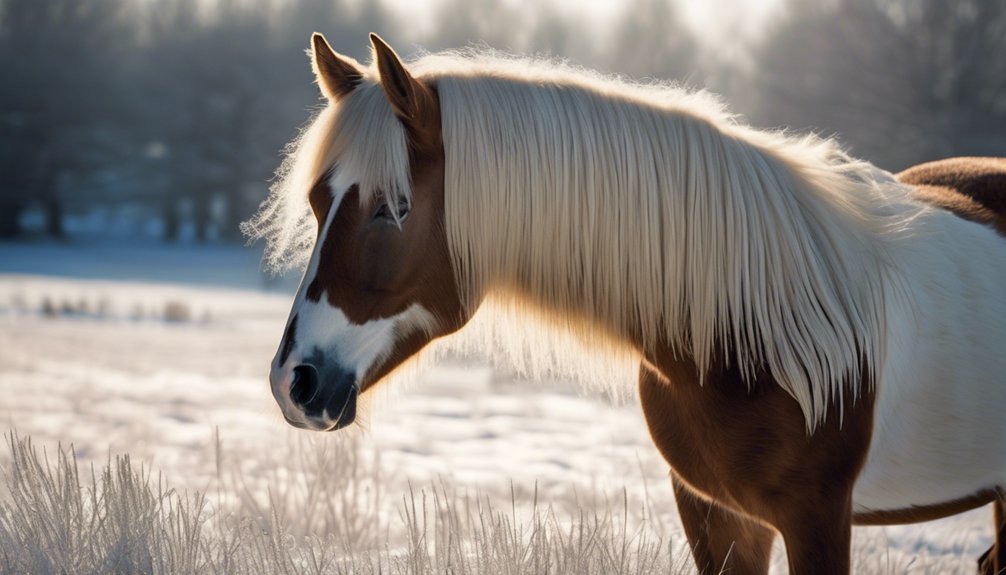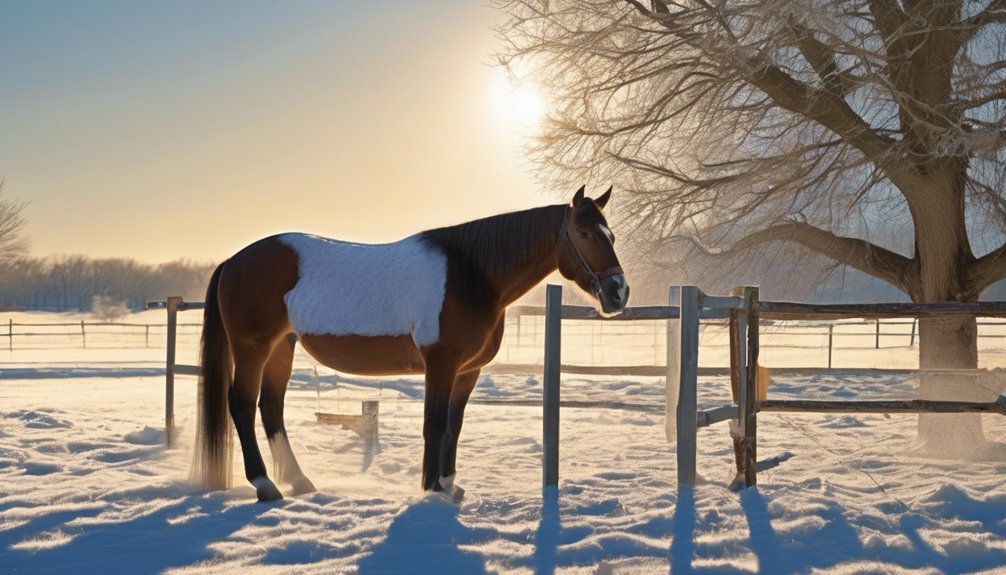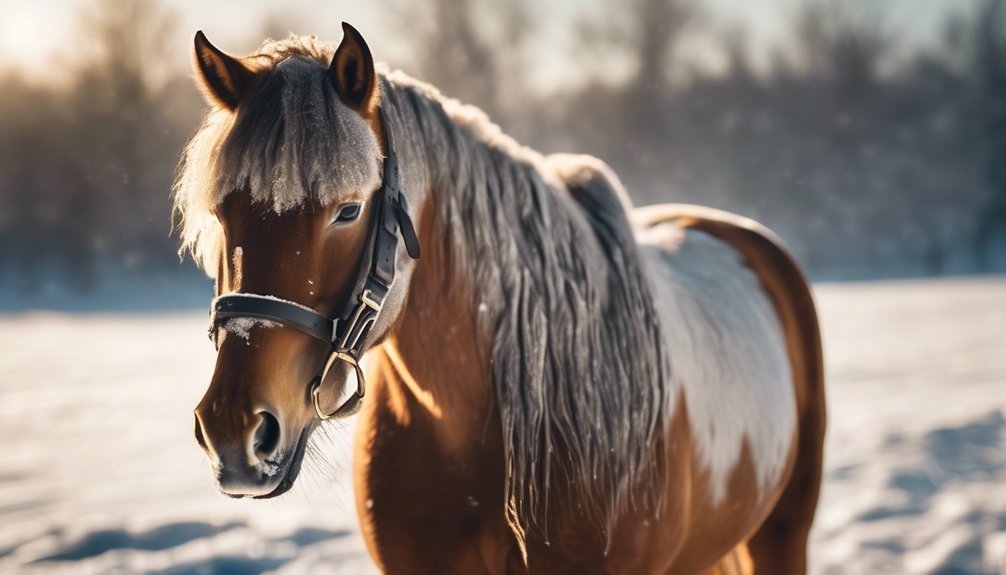
Maintaining your horse's coat during winter requires a proactive approach to grooming, diet, and environment. Regular grooming helps remove dirt and loose hair, which is essential for healthy skin. Adjusting their diet with specific fatty acids can enhance coat quality. Additionally, providing proper bedding and a warm space will protect them from cold stress. Understanding these factors is crucial, but there's more to consider for optimal coat maintenance throughout the winter months.
Key Takeaways
- Regular grooming removes loose hair and dirt, promoting healthy skin and a shiny coat during winter months.
- Adjust the horse's diet to include omega-3 and omega-6 fatty acids for optimal coat health and hydration.
- Choose appropriate bedding materials like straw or shavings to provide insulation and comfort in the stable.
- Ensure stable ventilation to maintain a dry environment and prevent moisture-related skin issues.
- Monitor your horse's weight and body condition to support overall health and coat quality during colder weather.
Understanding the Impact of Winter on Your Horse's Coat

As winter approaches, it's crucial to understand how the cold weather affects your horse's coat. During this season, your horse naturally develops a thicker coat to insulate against frigid temperatures.
This coat thickness not only keeps them warm but also requires special attention. You may notice increased winter shedding as your horse's body adjusts to the changing temperatures.
Regular grooming helps remove loose hair, promotes circulation, and can prevent skin issues. Pay close attention to areas prone to moisture or dirt accumulation, as these can lead to discomfort or health problems.
Adjusting Your Horse's Diet for Optimal Coat Health
Winter's impact on your horse's coat goes beyond just grooming; it also involves nutrition. To maintain a healthy coat, you must make dietary adjustments that focus on achieving the right nutrient balance.
Consider increasing the intake of omega-3 and omega-6 fatty acids, which promote a shiny, soft coat. Incorporate high-quality forage and supplements rich in vitamins A, E, and biotin, as these nutrients support skin health and coat growth.
Don't forget to ensure your horse stays well-hydrated, as hydration affects skin elasticity. Monitor your horse's weight during winter; maintaining a healthy body condition is crucial for optimal coat health.
The Importance of Regular Grooming

While many horse owners might think grooming is just about aesthetics, it plays a crucial role in maintaining your horse's overall health, especially during the winter months.
Regular grooming helps to remove dirt, debris, and dead hair, promoting healthy skin and coat. Additionally, it allows you to check for any signs of injuries or irritations that might be hiding beneath the thick winter coat.
Consider these essential grooming techniques:
- Use a curry comb to loosen dirt and hair.
- Follow up with a stiff brush to remove debris.
- Finish with a soft brush for a polished look.
Having the right grooming tools is vital for effective grooming.
Choosing the Right Bedding for Your Horse
Choosing the right bedding for your horse is essential for their comfort and health, especially during colder months. Opt for bedding materials like straw, shavings, or sawdust, which provide insulation and absorb moisture effectively. Each option has its benefits; for instance, straw is soft and warm, while shavings are more absorbent and create less dust.
Proper bedding maintenance is crucial—regularly clean the stall to remove waste and old bedding to prevent mold and bacteria growth.
Replace soiled bedding promptly and ensure your horse has a clean, dry area to rest. By selecting appropriate bedding materials and maintaining them well, you'll create a cozy environment that supports your horse's well-being throughout winter.
Managing Your Horse's Environment

Creating a comfortable environment for your horse goes beyond selecting the right bedding.
You need to focus on stable ventilation and moisture control to ensure your horse stays healthy and cozy throughout winter.
Consider these key elements:
- Airflow: Ensure your stable has proper ventilation to prevent dampness and improve air quality.
- Humidity: Regularly monitor moisture levels; a dry environment helps maintain your horse's coat and skin condition.
- Temperature: Keep the stable warm enough without overheating, as drastic temperature changes can be stressful for your horse.
Utilizing Supplements for Coat Maintenance
To keep your horse's coat healthy and vibrant during the winter months, incorporating the right supplements can make a significant difference.
Coat supplements rich in omega fatty acids, biotin, and zinc can enhance your horse's coat condition, promoting shine and softness. These nutrients help maintain the nutritional balance essential for a robust winter coat.
When selecting a supplement, look for those specifically designed for coat health, as they provide targeted benefits.
Regularly assess your horse's diet to ensure it meets their unique needs during colder months.
Remember, a well-nourished horse not only looks beautiful but also feels great.
Recognizing and Addressing Skin Issues

Even with proper supplementation, horses can still face skin issues during winter.
It's essential to recognize these problems early to maintain your horse's health and comfort. Look out for signs like:
- Red, inflamed patches that can indicate skin allergies
- Foul odors or unusual discharge suggesting fungal infections
- Excessive scratching or rubbing, which could signal irritation
Addressing these issues promptly is crucial. If you notice any of these symptoms, consult your veterinarian for an accurate diagnosis and treatment plan.
You may need antifungal medications or allergy treatments. Regular grooming helps remove dirt and dead hair, reducing the risk of infections.
Frequently Asked Questions
Can I Use Human Shampoo on My Horse's Coat?
You shouldn't use human shampoo on your horse's coat. It can disrupt coat health and natural oils. Instead, choose horse grooming products specifically designed for their unique needs, ensuring a healthy, shiny coat year-round.
How Often Should I Bathe My Horse in Winter?
You shouldn't bathe your horse too often in winter; once a month's usually enough. Focus on winter grooming tips like brushing to remove dirt and debris, maintaining a healthy coat without risking their warmth.
Is It Necessary to Clip My Horse's Coat in Winter?
Clipping your horse's coat in winter can enhance comfort and hygiene. Employing proper clipping techniques helps manage body heat and reduces sweating. The benefits of a well-groomed winter coat promote overall health and a happier horse.
What Types of Brushes Are Best for Winter Grooming?
In your grooming curriculum, remember that a soft body brush, a curry comb, and a mane and tail brush are essential. These grooming techniques keep your horse's coat healthy, shiny, and beautiful throughout the winter months.
Can Stress Affect My Horse's Coat Condition in Winter?
Yes, stress factors like changes in environment or routine can negatively impact your horse's coat health. Regularly monitoring their stress levels and providing a calm, consistent atmosphere helps maintain their coat condition throughout winter.
Conclusion
So, if you want your horse to have a coat that shines like a disco ball at a 70s party, you've got to put in the effort. Regular grooming, a balanced diet, and a cozy environment aren't just suggestions—they're essentials! Remember, your horse isn't a snowman; it can't just throw on a scarf and call it a day. By following these steps, you'll ensure your equine friend stays fabulous and warm all winter long.





